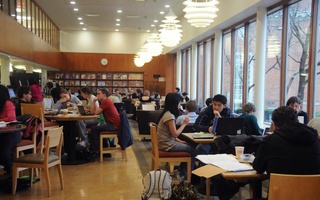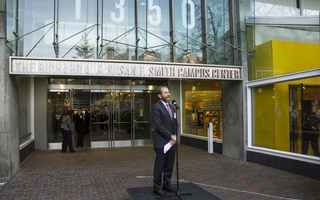College administrators will begin accepting nominations next Monday to fill undergraduate positions on the student-faculty Honor Council that will adjudicate academic integrity cases starting next fall.
The Honor Council, which will roll out with the implementation of the College’s first honor code next year, will usher in major changes to how the College addresses instances of alleged academic dishonesty. Currently, the Administrative Board, which has no student members, hears all cheating cases.
According to Interim Secretary of the Administrative Board Brett Flehinger, everyone with a Harvard PIN will be able to nominate sophomores and juniors from Nov. 3 to Nov. 21. Administrators will ask undergraduates nominated through this process to apply for a position on the council by the end of the semester.
A group consisting of representatives from the Dean of the College’s office, the Office of Undergraduate Education, and the Academic Integrity Committee will review all applications for the positions. The College will interview candidates at the end of January and name chosen students by February.
Administrators will eventually solicit nominations for potential Honor Council members from the freshman class, but that process will begin in the spring semester.
“We’re really excited to see this multi-year effort get to this stage,” Dean of the College Rakesh Khurana said in an interview on Tuesday.
While administrators have not yet decided exactly how many students will sit on the council, Dean of Undergraduate Jay M. Harris, who chairs the Academic Integrity Committee, said there may be about 15. No matter the number, half the council will be made up of students; the other half will be a mix of faculty members and administrators.
Khurana said that the College hopes to recruit a “broad” range of students from a variety of academic and personal backgrounds. An online position description lists “discretion, sensitivity, [and] empathy,” among others, as desired qualities in Honor Council candidates. Harris added that an ideal Honor Council member would also be “committed to the academic mission of the College.”
Reiterating comments by various administrators that serving on the Honor Council will be a “major commitment,” Flehinger said in an interview Tuesday that the students chosen to serve would undergo “intensive” training, including weekly seminars from March to June and more training in mid-August.
“We want to make sure this works the first time,” Flehinger said, adding that the training would include practice run-throughs of Honor Council meetings. During the school year, members of the council will be responsible for attending and preparing for monthly meetings, according to Flehinger, as well as going through additional training.
Alongside efforts to recruit potential members of the Honor Council, administrators will also solicit nominations for students to serve as peer advisors to other students who go before the council next year.
While administrators have laid out how they intend to select members of the honor council, the College has not yet recommended how frequently students would be required to sign a statement affirming their commitment to the honor code, another proposed rule that still needs to be approved by the Faculty of Arts and Sciences. Administrators hope to gain Faculty approval of this provision by the end of the academic year, according to Harris, but he added that the failure to secure final approval by that date would not “derail” next fall’s implementation of the rest of the honor code, which includes the Honor Council.
—Staff writer Madeline R. Conway can be reached at mconway@thecrimson.com. Follow her on Twitter @MadelineRConway.
—Staff writer Steven S. Lee can be reached at steven.lee@thecrimson.com. Follow him on Twitter @StevenSJLee.
Read more in College News
HUDS 'Traffic Light' Labels Raise ConcernsRecommended Articles
-
UC Tickets Struggle To Court AdminsThe two major tickets in this year’s Undergraduate Council presidential election have obstacles to overcome before they can develop a better rapport with top University administrators.
-
New FAS Policy Reduces DeficitsThe Faculty of Arts and Sciences is nearing the end of a redesigned budgeting process used to help reduce a deficit that currently stands at $80 million.
-
 College Struggles With Social Space
College Struggles With Social Space -
Raise Your VoiceWe sincerely believe that students should have a stronger, more unified, productive voice on campus, in communicating with each other and with the administration. This school can feel more like a distant institution than a place where we all live and study; students should be changing that, and we really want to help.
-
 Revelation of Second Email Search Contradicts Administrators' Previous Statement
Revelation of Second Email Search Contradicts Administrators' Previous Statement -
 College Working Groups Make Campus Center Recommendations
College Working Groups Make Campus Center Recommendations













